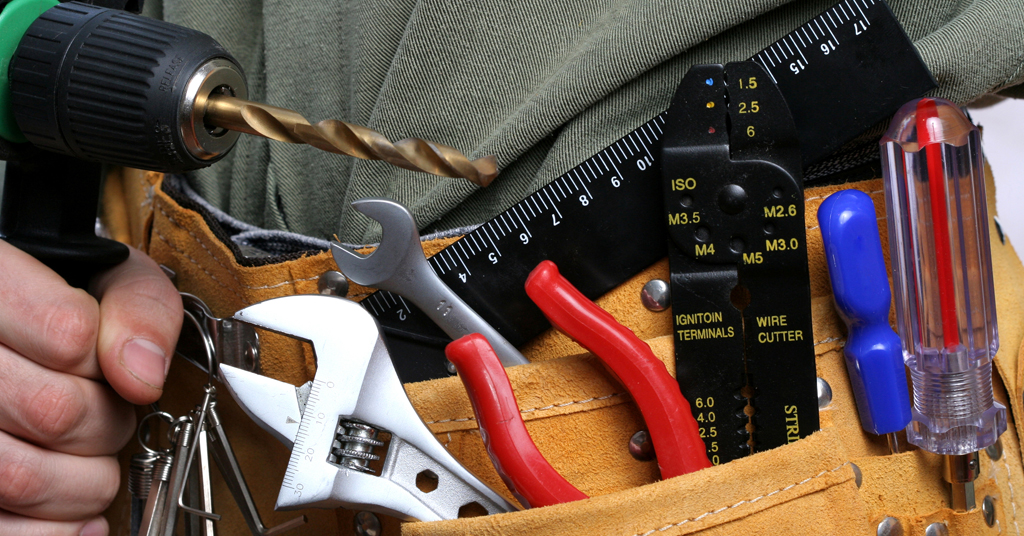18 MUST-HAVE APPLIANCE REPAIR TOOLS
The right appliance repair tools makes all the difference. They help you work faster and safer, so you can provide high quality service. For appliance repair technicians, being equipped with the right tools can turn a 2 hour job into a 30 minute job.
This article discusses 18 must-have appliance repair tools that will make life easier for field service technicians.

Appliance Repair Safety Gear
1. Safety goggles and masks
Protects your eyes and lungs from dusty areas that contain harmful debris and chemicals.
2. protective clothing
You’ll look professional and your uniform will stay clean. It also provides an extra layer of protection from chemicals coming into contact with your skin.
3. Work gloves
There are 2 types of gloves you should have in your toolkit: leather and rubber gloves. Leather ones can be used to protect your hands from sharp materials and edges. Rubber gloves are great for when you’re dealing with chemicals.
4. Durable boots
Work boots that offer proper grip, safety toe protection, rugged waterproof material, and strength and comfort technology.
5. Shoe covers
You’ll want to avoid making a mess in a customer’s home. Putting shoe covers on your boots will remove any chance of getting your customer’s floor dirty.
Appliance Hand Tools
6. Various Pliers
You’ll want needle-nose pliers to grip small appliances and bend and cut wires when needed. A standard plier will help you easily release hose clamps and a channel lock plier can help you loosen any water hose fittings.
7. Screwdriver Set
Flathead, Phillips, and Torx screwdrivers are necessary for most jobs.
8. Cordless electric drill
A cordless drill with spare batteries and several drill bits will make your job easier. Plus, it will help you work more efficiently, so you can get to your next appointment earlier.
9. Putty knife
The most common use for this is to spread putty, but it also can be used for scraping and prying when needed.
10. Nut Driver Set
It’s important to invest in Imperial and Metric sizes for a nut driver set, as some appliances use Metric fasteners and others use Imperial fasteners.
11. Wrench Set
You’ll more than likely need a wrench set in Metric and Imperial sizes to work on appliances. Make sure that your wrench set also includes a socket wrench and an adjustable open-end wrench.
12. Thread-sealing Tape
You’ll often work on appliances with water lines. Make sure to have thread-sealing tape to seal pipe fittings and prevent leaks.
13. Rechargeable Flashlight
Never worry about needing to replace batteries while on a job with a rechargeable flashlight. Many repair jobs require you to work in tight spaces with limited natural/environmental light.
Other Useful Appliance Repair Tools
14. Small Shop Vacuum
Leave your customer’s house clean. If you happen to make a mess, then use a small shop vacuum to clean up.
15. Handheld Steam Cleaner
Chemicals can spill on the floor by accident. Use a handheld steam cleaner to make sure your customer’s floor is as clean as it was when you arrived.
16. Multimeter
Often during appliance repair visits, technicians will discover an electrical problem. A multimeter allows you to test for an electrical current and voltage to figure out which parts of an appliance are still working. You will be using these a lot, so invest in a decent one, preferably a digital unit from a top brand.
17. Voltage Tester Pen
A voltage tester pen allows appliance repair technicians to check for voltage in wires without having to touch any wires. This tool helps protect technicians from potential electrical shock.
18. Appliance Repair Service Software
The best appliance repair service software will help manage your business with easy scheduling, dispatching, lead management, invoicing, and billing. SAWIN Field Service Management Software will help grow your business and automate your operations.
Booking that essential appointment can make or break your field service business. Imagine transforming every call into an opportunity—not just for a simple scheduled visit, but for building lasting relationships and driving growth in your organization. In this blog, we’ll unlock the secrets to turning mundane phone calls into powerful marketing tools.
Are you tired of he stress of overdue payments looming over your business and that sinking feeling every time an invoice goes unpaid? Say goodbye to collections agencies. Let’s dive into how modern invoicing solutions can revolutionize the way you manage finances while keeping your focus where it truly belongs: on growing your business!
Have you ever considered how those seemingly innocuous expenses—like travel time, equipment wear and tear, or unexpected overtime—can silently chip away at your bottom line? In this blog post, we’ll uncover these elusive budget busters and arm you with strategies to keep them in check.
Join us as we dive deep *Behind the Pipes* to explore five key differences between commercial and residential plumbing that could affect everything from installation costs to maintenance routines. This engaging guide will equip you with insights into how these distinct worlds operate—and why understanding them can save you time, money, and headaches down the line!
GET YOUR DEMO TODAY!
With over 37 years as a leader in field service management, it’s no wonder why service and installation businesses trust SAWIN for its personalized approach.





